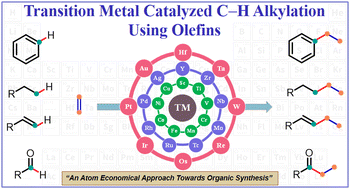Transition-metal-catalyzed C–H bond alkylation using olefins: recent advances and mechanistic aspects
Abstract
Transition metal catalysis has contributed immensely to C–C bond formation reactions over the last few decades, and alkylation is no exception. The superiority of such methodologies over traditional alkylation is evident from minimal reaction steps, shorter reaction times, and atom economy while also allowing control over regio- and stereo-selectivity. In particular, hydrocarbonation of alkenes has grabbed increased attention due its fundamental ability to effectively and selectively synthesise a wide range of industrially and pharmaceutically relevant moieties. This review attempts to provide a scientific viewpoint and a systematic analysis of the recent developments in transition-metal-catalyzed alkylation of various C–H bonds using simple and activated olefins. The key features and mechanistic studies involved in these transformations are described briefly.



 Please wait while we load your content...
Please wait while we load your content...